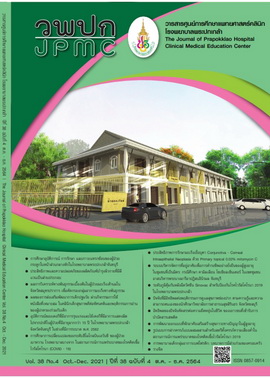The Influence of Selected Factors on The Resilience of Youths Receiving Substance Abuse Treatment
Main Article Content
Abstract
BACKGROUND: Substance abuse among youths is a problem that affects both physical and psychosocial health. Resilience is one of the key factors that prevent young people from engaging in substance abuse.
OBJECTIVE: To study the influence of selected factors on the resilience of youths receiving substance abuse treatment.
METHODS: This predictive correlational research aimed to study selected factors affecting the resilience of youth who were undergoing substance abuse treatment at treatment facilities of the Ministry of Defense in the eastern area of Thailand. The 280 samples were selected by using a simple random sampling, and data collected from April to November, 2020. Data were collected by using questionnaires consisting of 6 parts, which asked the respondents questions regarding their personal information, resilience, social support, self - esteem, family connectedness, and a self - stigma in substance abuse scale. The Cronbach alpha coefficients were 0.78, 0.93, 0.82, 0.78 and 0.85, respectively. Descriptive statistics and the Enter method of Multiple Regression were employed for data analyses.
RESULTS: The results showed that youths receiving treatment for addiction had an average resilience of 77.9 (SD = 9.6). Most of them (52.1%) had a high level of resilience. The results of the Enter method of Multiple Regression analysis showed that all four factors could affect resilience with a multiple correlation coefficient R = 0.456. Those influencing factors had a covariate of resilience with a statistical significance of 19.6% (R2 = 0.196, p < 0.001) and a standard deviation predictor of 5.971. However, there were just three factors that could predict resilience statistically: social support (β = 0.260, p < 0.001), self - esteem (β = 0.232, p < 0.001), and family connectedness (β = 0.176, p < 0.01).
CONCLUSIONS: This research results deliver significant background information for the development of activities or programs to enhance life resilience among youths undergoing substance abuse treatment by promoting social support, self - esteem, and family connectedness.
Article Details
References
Kalayasiri R. Facts and figures :illegal substances in Thailand 2017-2020. Songkhla: Centre for Addiction Studies (CADS), Faculty of Medicine, Prince of Songkla University; 2020.
Ministry of Justice. Office of The Narcotics Control Board. Annual report 2019: Thailand Narcotics Control. Bangkok: Office of The Narcotics Control Board; 2020.
Princess Mother National Institute on Drug Abuse Treatment. Statistics on Drug Abuse Treatment of Princess Mother National Institute on Drug Abuse Treatment in the fiscal year 2016-2020 [Internet]. 2020 [cited 2021 Feb 17]. Available from: http://www.pmnidat.go.th/thai/index.php?option=com_content&task=view&id=3274&Itemid=53
Luthar SS, Cicchetti D, Becker B. The construct of resilience: a critical evaluation and guidelines for future work. Child Dev 2000;71:543-62.
Grotberg EH. Resilience for today: Gaining strength from adversity. Connecticut: Praeger; 2003.
Suntornvijitr S, Hengudomsub P, Vatanasin D, Detchaiyot P. Predicting factors of depression among secondary school students in extended educational opportunity schools. Nursing Journal of the Ministry of Public 2018;28(2):53-66.
Sirathatnararojana T, Voracharoansri S, Meesuk P. The relationship of self-esteem and resilience of undergraduate students. Veridian E-Journal, Silpakorn University 2016;9:715-32.
Nihayati HE, Herawati I, Wahyudi AS. The relationship between stigma, resilience, and quality of life from family members taking care of schizophrenic patients. Sys Rev Pharm 2020;11:823-8.
Polit DF, Beck CT. Nursing research: generating and assessing evidence for nursing practice.
Parinyaphol P. Resilience of University Students of Prince of Songkla University, Pattani Campus. Songklanakarin J of Social Sciences & Humanities 2007;13(2):137-53.
Tungmephon P. Social support, caregiving preparedness and stress among mothers of autistic children [dissertation]. Chiang Mai: Chiang Mai University; 2005.
Silpakit P, Silpakit O. The psychometric property of Rosenberg Self-esteem Scale in Thai youth. J Ment Health Thai 2016;24:15-28.
Nopparat P. Factors related to sexual risk behaviors among high school and vocational students [thesis]. Chiang Mai: Chiang Mai University; 2000.
Luoma JB, Nobles RH, Drake CE, Hayes SC, O'Hair A, Fletcher L, et al. Self-Stigma in substance abuse: development of a new measure. J Psychopathol Behav Assess 2013; 35:223-34.
Grotberg EH. A guide to promoting resilience in children: strengthening the human spirit - early childhood development: practice and reflections number 8. The Hague: Bernard van Leer Foundation; 1995.

